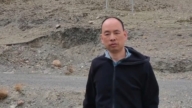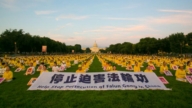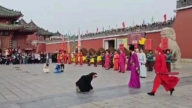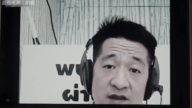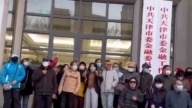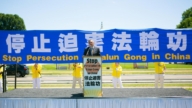【新唐人2013年01月02日讯】大陆门户网站《腾讯网》刊文回顾2012年,并向中国一群拒绝向强权与独裁妥协的“反对者”致敬,说他们义举令人佩服,并暗示“当民众被‘逼到墙角’,惟有‘反对’才可能破墙而出。” 文章发出后,引发网民的热评和转载,但是,文章当天被删除,目前中国四大微博也禁止搜索这篇文章。
《腾讯》新闻“2012年终策划:致敬十大反对者”,这篇文章指出,能不畏强权、捍卫自由价值的人,总是让人格外尊敬。因为他们的坚持,才让强权政府无法肆无忌惮﹔因为他们的毅力,才让社会公义复活苏醒。
文章表示,2012年,中国就有这样一群拒绝向强权与体制妥协的“反对者”。文中提到的十大“反对者”包括:
一,不公选举的反对者——乌坎村民。2011年广东乌坎事件,数万民众抗议村官贪腐,经过3个月的血泪抗争,终于争取到一人一票的“民主”选举。
二,决策不透明的反对者——什邡、启东市民。四川甚邡两万民众抗议高污染钼铜项目,面对当局的暴力镇压,一群中学生喊出:“为了什邡,我们可以牺牲,我们是90后”﹔而江苏南通启东数万民众,抗议纸厂排污管道修建计划,他们冲进市政府,扒掉市委书记的上衣。最后两地政府都选择了妥协。
三,洗脑的反对者——香港市民。香港万民反“洗脑”,9月初,香港一名15岁少年,带领一群中学生,反对已排上日程的“国民教育科”,随后得到家长及众多市民声援,12万香港市民包围政府总部,最后港府妥协。
四,言论管制的反对者——任建宇。因转发微博,被劳教两年的重庆网民任建宇,被提前释放后,起诉重庆劳教所,并在网路上推动废除劳教制度。
五,教育权不公反对者——占海特。江西籍上海女孩占海特,5月在微博上公开争取异地考试权利,她把数百万学生无法在非户籍地参加考试的现实,推到舆论的焦点。
六,计划生育反对者——杨支柱。中国青年政治学院法律系副教授杨支柱,因妻子怀第二胎遭学校解聘,并被迫上缴24万多元的超生费,他撰文批“计生政策”,并以“卖身交罚款”等行为艺术进行抗争。
七,平坟运动反对者——赵克罗。河南政协常委赵克罗,在微博炮轰平坟运动。
八,有毒食品反对者——吴恒。“掷出窗外”网站的创办人吴恒,揭露中国有毒食品泛滥的社会残酷现实。
九,商业霸权反对者——罗永浩。网民罗永浩反对西门子商业霸权,两次举办“砸冰箱秀”。
十,一切不公的反对者——全体网民。全体网民在网路的每个角落呐喊、抵抗社会上的一切不公,并曝光了大量“表哥表叔”、“房婶房叔”,扳倒一批贪官、淫官,吓得官媒日批网路14天。
法学家、中国问题研究专家赵远明:“很多都是某些地方,政府或者政府官员,对政策的制定或者是政策的执行,都可以说是违法的,所以激起了人民的不满,产生很多抗争,对统治者的反对。所以这些情况的出现,实际主要根源在于中共的独裁统治,像各官员,各地方贪腐,所以引起社会的反抗。”
“致敬十大反对者”一文发出后,当天在腾讯、百度贴吧等网站就被删除。目前在网易、新浪等四大微博上也被禁止搜索。
北京时政观察人士华颇:“中国的执政者传统来说,就是愿意中国的民众当顺民,就是政府怎么说,他们就怎么做,不能够提出自己的愿望,所以这10个人物和群体,绝对不能成为官方要宣传的对像,所以官方必然要封杀,免得越来越多的人向这些人看齐。”
中国问题研究专家赵远明还指出,这种对暴政的反抗,在社会上有很强的民众基础,随着中共独裁统治的加剧,相信这种抗议会越来越普遍。
采访编辑/李韵 后制/钟元
CCP Bans ‘2012 Review: Tribute to the Top 10 Opponents’
Tencent.com, a popular Chinese portal website,
published a review article about 2012.
The author honored those “opponents” who resisted
compromising with the Chinese Communist Party’s (CCP) dictatorship, saying “their righteous acts are admirable.”
The article also suggests, when the civilians are cornered,
the only way to break out is to become “an opponent.”
Since being published, the article has been actively
discussed and cited by many Chinese netizens.
However, it was deleted a day after its publication and it is
banned for search on the four major microblog sites in China.
The news channel of Tencent.com published an article,
titled, “2012 Review: Tribute to the Top 10 Opponents.”
The article said, those who uphold the value of protecting
the freedom against power deserve our respect;
it is their perseverance that stops
the brazen behavior of the government;
it is their willpower that awakens
the sense of justice in our society.
The article lists individual or group “opponents” in China,
who refuse to yield to CCP’s pressure and dictatorship.
The full list of the 10 most important “opponents” follows.
First, the opponents of unfair elections,
the Wukan villagers.
In 2011, tens of thousands of villagers in Wukan,
Guangdong Province protested against corrupt officials.
After struggling for over three months, the village election
was finally held in a democratic manner in 2012.
Second are the opponents of the non-transparent
policy decisions, the residents of Shifang and Qidong.
Over twenty thousand residents of Shifang City, Sichuan
Province protested against the highly polluting molybdenum copper project.
When confronted by the violent CCP’ regime suppression,
a group of middle school students shouted out, “We are post 90’s and we are ready to sacrifice ourselves for our city.”
In Qidong, Jiangsu province, tens of thousands of residents
protested against constructing a waste discharge plant.
They rushed into the municipal building,
and stripped the clothes of the city’s CCP secretary.
At the end, both city governments chose to compromise
with the residents.
Third in the list are the opponents of CCP’s brainwashing
education, the people of Hong Kong.
In early September, a 15-year-old boy led a group of middle
school students to protest against the proposed curriculum of “Moral and National Education.”
Their acts were subsequently supported by many parents
and Hong Kong residents.
Around 120,000 later protested in front of the government
headquarters, causing the Hong Kong administration to compromise in the end.
As number four is listed the opponent of speech control,
Ren Jianyu.
Ren is a Chongqing’ netizen with a 2-year labor camp
sentence for spreading sensitive photos on the Internet.
After an early release, Ren sued the Chongqing Forced
Labor Camp, and started an online movement to seek abolishment of the reeducation-through-labor system.
Fifth is the opponent of unfair right of education,
Zhan Haite.
Zhan, a Shanghai girl with household registration in Jiangxi,
called for equal education opportunities for non local students on her microblog in May.
Her efforts had drawn media attention on the fact that
millions of Chinese students are not allowed to take exams in places other than where their household registration is.
Number six is the opponent of CCP’s one-child policy,
Yang Zhizhu.
Yang was a Law Professor in the School of Political Sciences
at China Youth University.
He was laid off by the School because his wife got pregnant
with a second child.
For that he was forced to pay over 240,000 Yuan as a fine.
Yang wrote articles critical to CCP’s one-child policy,
and continued to protest with performance-art-like acts.
Seventh is the opponent of the ancestral grave-razing,
Zhao Keluo.
Zhao is CCP’s standing committee member of the
provincial political consultative conference in Henan.
On his microblog he strongly opposed the grave-razing
movement, an initiative of the Henan government.
Eighth in the list is the opponent of toxic foods,
Wu Heng.
Wu is the website founder of zccw.info,
which focuses on the food safety issues in China.
He fought to reveal the extremely serious
food safety problem in China.
Number nine is the challenger of commercial hegemony,
Luo Yonghao.
Luo is well known Internet figure. He smashed refrigerators
twice in front of the Siemens headquarters in Beijing, to protest against their commercial hegemony.
And last but not least are the opponents
of all injustices, the netizens of China.
Chinese netizens have been raising their voice consistently
against every and each injustice in the Chinese society.
They exposed many officials who are corrupt or dissolute,
such as the notorious “Watch uncle” or “House aunt.”
They are so powerful that the official media has to attack
their Internet speeches incessantly, day in and day out.
Zhao Yuanming (Jurist and China Issues expert): ”We can say,
in many places procedures of policy making or implementing by local government officials are illegal.
This has led to a lot of grudges and resistance
from the local residents.
They stood out to oppose the rulers. Thus the emergence
of all opponents is basically a result of CCP’s dictatorship.
It is a problem of the regime itself, such as its corruption,
that leads to such a degree of resistance by the society.”
Only a day after being published, this article was deleted
on Tencent.com, Baidu.com and other Chinese websites.
Currently, it has also been banned for search
on the four major microblog sites in China.
Hua Po (Current Affairs observer, Beijing): ”Traditionally,
the rulers of China like their civilians to be obedient.
That is, they should follow whatever the government
tells them to do. They should not voice out any expectations.
In this sense, the individuals and groups mentioned
by this article are definitely not something the authorities want people to know.
They had to ban the article to prevent more people
from learning from those opponents.”
Zhao Yuanming further remarked, the resistance against
tyranny has very strong roots in the Chinese society.
He believes that such protests will become more universal
with the continuing worsening of the CCP.


